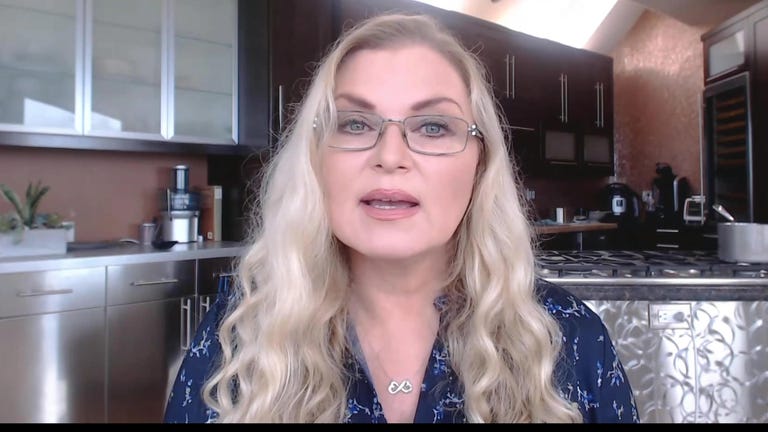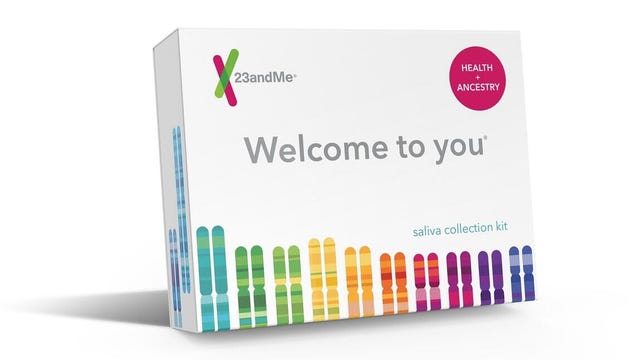DNA testing kits are great tools for determining family history, but their usefulness goes beyond estimating ethnicity. Test kits can be very helpful as they can provide information about the medical conditions you are susceptible to by testing your DNA sample. The best genetic tests are from Ancestry and 23andMe. The latter was the first company to offer DNA testing kits that can be used from the comfort of your home. However, following the company’s report, financial difficulties and data breachyou might be curious to see how the other options stack up.
Below, we’ll compare 23andMe and one of the most popular alternatives, Ancestry. Here’s how to decide which one is best for you.
Ancestry vs. 23andMe
I tried the AncestryDNA kit. It comes with a saliva collection tube and cap, a return bag, and a prepaid return label box. To register the kit, I downloaded the Ancestry app and scanned the barcode on the side of the collection tube. You can also register your kit online and simply enter the number manually.
Once you create an account, the app will ask for your consent for several things, including processing your sample, storing it for future testing, and participating in research. The research includes conducting surveys and questionnaires, which AncestryDNA says it will use to better understand human history and health.
I refused to consent to sample storage or participation in the study. AncestryDNA will ask you several questions about your health history. You can edit what information is public or private on the site, and how it appears to other users if your DNA matches theirs. You can review all the information before continuing.
read more: In the future, even your DNA will not be sacred.
Ancestry does not use the standard Y chromosome or mitochondrial DNA methods that most other companies use. As a result, little is known about how Ancestry actually analyzes DNA.
After spitting into the tube, I mailed the kit and confirmed it was shipped on the app. The app “tracked” the kit’s journey from receipt to processing at the lab before notifying me that the test results were ready.
Results include AncestryHealth and Ethnicity Estimate reports. AncestryDNA also shows you how similar your DNA is to other users. I flagged my aunt, who also used the site, as a next of kin. The app allowed us to compare our ethnicity estimates and also gave us the option to message her.
read more: What AncestryDNA taught us about the complex world of DNA, privacy, and genetic testing
Strong Points:
- You may refuse to have your sample stored or participate in research.
- AncestryHealth reports are categorized into Notable Health Results, Health Results, and Wellness Results. Reports include information about cancer risk, carrier status for diseases such as cystic fibrosis, and blood health.
- Health reports provide information such as vitamin levels.
- AncestryHealth can flag potential health conditions based on shared family history or mutations detected in a DNA sample.
- you, Ethnicity estimation reportThis tells you which region of the world your ancestors are most likely related to. This area on the map was color-coded along with other areas to which my DNA was linked. The AncestryDNA region list includes over 1,000 regions where samples are tested, so you can also see where your DNA gave no results.
Cons:
- The genealogy side and the DNA side required two separate apps. When you work in a browser, the desktop version keeps everything in one place.
- Health tests are not approved by the Food and Drug Administration.
I tried the Health and Ancestry kit, which comes with a saliva collection tube and cap, a return bag, and a prepaid return label box. Like AncestryDNA, 23andMe also required kit registration (in-app or online) before testing. I downloaded the app and scanned the barcode on the side of the collection tube. You can also enter the code manually.
Similar to AncestryDNA, the 23andMe kit also asked for consent for several items when creating an account. You could save samples for future tests, participate in research, get health reports, and share step data from your fitness app for a more comprehensive view of your activity. . I declined everything except the health report.
Ancestry is different from 23andMe do It is FDA-approved as a risk screener for a small number of genetic conditions and diseases. If you are primarily interested in DNA testing for this purpose, 23andMe is a better choice.
The app tracked the journey of my sample to the lab and the DNA extraction process. The app tested 216 populations to generate the report.
23andMe lets you view your results in a timeline, so you can see approximately how many generations ago your most recent ancestors came from each region. For example, my results revealed only a small amount of Ashkenazi Jewish background, but the timeline showed that their relatives would have lived five to eight generations earlier. Results can also be viewed as a chromosome painting, showing where on the chromosome a particular region was matched and how widespread that region is.
There were many aspects of the results to explore. For example, 23andMe provided detailed information about each region where my DNA matched. When you tap on a country icon, 23andMe tells you about the region’s history and migration patterns over time, and provides resources to learn about its culture, how to book an Airbnb in your destination, and other features. He gave it to me. You can also search for potential relatives among 23andMe users, and I was able to find my mother’s cousin.
Strong Points:
- 23andMe is FDA approved for risk screening.
- The 23andMe health report included predisposing factors, carrier status, health status, characteristics, and health action plan. Test for predisposing factors such as Parkinson’s disease, type 2 diabetes, and celiac disease. The lab will test for specific genetic mutations.
- The wellness report included interesting items such as whether you are a deep sleeper, how much you are likely to move during sleep, your genetic weight, and other factors.
- The reported characteristics are of particular interest. These detailed my chances of having a certain eye color, hating coriander, getting freckles, hating the sound of eating, being susceptible to mosquito bites, etc.
Cons:
- As with AncestryDNA, 23andMe specified that test results do not indicate a diagnosis or guarantee that you will not be diagnosed with the disease in the future.
AncestryDNA vs. 23andMe cost comparison
The best DNA kits come in a variety of services and at different prices. Let’s take a closer look at AncestryDNA and 23andMe’s services and costs.
Ancestry DNA cost
- Ancestor DNA ($99): Ancestry’s basic service lets you search for family connections in its U.S. database.
- Ancestor DNA + Family Tree ($100): Includes access to international records to trace your genealogy.
- AncestryDNA Traits + All Access ($199): This level provides access to historical records and 35 genetic traits, in addition to other services.
23andMe cost
23andMe offers four different DNA test kits. All four products include ancestry reports, kinship search options, trait reports, and family tree building.
- Ancestry and Trait Services ($119): Includes ancestry reports, relative search options, trait reports, and family tree building.
- Health and Ancestry Services ($199): Includes carrier status report, health predisposition, and health status report.
- 23andMe Plus Membership ($268): Only with a 23andMe Plus membership, enhanced ancestry features, pharmacogenetics reports, and consistent updates to existing reports.
- 23andMe Plus Total Health ($999): Builds on the 23andMe Plus membership report and adds clinical care based on blood testing, biological age identification, and genetics.
conclusion
Ancestry is best known for its genealogy features. Use DNA testing services to consolidate your results and view them all in one browser. The information is split between two different mobile apps, so it’s not very useful. Overall, Ancestry’s tools, including the ability to build trees and link health status and DNA insights, definitely help paint a complete picture of a person’s origins and facilitate conversations with newly discovered family members. will help you.
23andMe has a more user-friendly layout and presents its discoveries in a way that encourages immersion in a (perhaps newly discovered) tradition. It doesn’t have the same strengths as Ancestry when it comes to building your family tree. I was able to view the prediction tree, but it was sparse and included only other 23andMe users.
Since I already knew my family’s origins, I can say that both kits seemed to give accurate results.
Who should choose AncestryDNA:
- If you’re working on a family history project, AncestryDNA is for you. Please note that your family tree and DNA information are in two separate apps.
Who should choose 23andMe:
- If you want to learn about your genetics and health information, you’ll probably turn to 23andMe. You’ll love the easy-to-read format.
To learn more, see how I used technology to uncover more of my family tree. You can also order DNA tests from other services for your petif you really want to.

Look at this: Here’s how genetic genealogist CeCe Moore finds potential criminal suspects
Ancestry and 23andMe FAQs
Which is more accurate: AncestryDNA or 23andMe?
AncestryDNA and 23andMe both seem to give accurate results. Ancestry has a larger DNA database, but 23andMe has a more user-friendly layout. These are two of the best options available.
What is the difference between 23andMe and Ancestry?
23andMe and Ancestry are two of the best DNA kits available. When deciding which one to choose, it comes down to what you want to get out of your search. If you’re looking for thorough health information, check out 23andMe. If you’re looking for family or building a family tree, Ancestry is a better option.
Which DNA site most accurately indicates ethnicity?
AncestryDNA is one of the best DNA tests for accurately assessing ethnicity thanks to its extensive DNA database. The results are categorized into AncestryHealth and Ethnicity Estimate reports. The Ethnicity Report is a detailed look at which regions your ancestors are associated with.
If you want to learn more about your genetics and health information, 23andMe is the place to go. This is one of the most popular DNA kits available. This website and app is great for dissecting all the information provided about your health, ancestry, and characteristics. Additionally, 23andMe is FDA-approved as a risk screening device for several genetic conditions and diseases.
Correction, July 3rd: An earlier version of this story replaced the “Who should you choose?” section. The error has been fixed.






